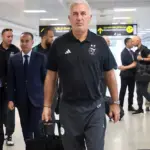Cameroonian Football Federation accused of withholding part of Rigobert Song’s salary

Rigobert Song is reportedly preparing legal action against the Cameroonian Football Federation (Fecafoot), following allegations that a portion of his salary as national team coach was never paid to him despite full disbursements being made by the state.
According to multiple credible sources cited by local outlet Camfoot, Song, who managed the Indomitable Lions until early 2024, claims that significant sums of money—meant to be transferred to his account—never arrived.
The scandal has added yet another layer of controversy to a federation already marred by allegations of mismanagement and financial irregularities under the presidency of former football star Samuel Eto’o.
Song, a former captain of the national team and revered figure in Cameroonian football, is now seeking compensation amounting to nearly 198 million FCFA (approximately €302,000).
The sum, according to reports, reflects the unpaid portion of his salary. His legal pursuit could potentially result in additional damages, with some estimates suggesting he may seek more than what was awarded to his predecessor, Portuguese coach António Conceição, who also had a contentious departure from the post.
What distinguishes Song’s case from that of Conceição is the nature of the alleged financial mismanagement. While the Portuguese coach’s salary was reportedly never paid at all, Song’s situation appears more complex.
The Ministry of Finance is said to have fulfilled its financial obligation, transferring 19 million FCFA (around €29,000) monthly to Fecafoot—funds earmarked specifically for Song’s salary.
However, the coach reportedly received only 10 million FCFA (approximately €15,000) per month, leaving a monthly shortfall of 9 million FCFA unaccounted for.
The discrepancy has prompted serious concerns over transparency within Fecafoot’s financial operations. The lack of clarity surrounding the payments has sparked speculation over possible embezzlement, particularly as no explanation has been offered for the missing funds.
The irony is not lost on observers: Samuel Eto’o, who appointed Song to the role in a decision widely criticised for favouritism, now finds his administration implicated in mishandling the financial agreement of his own appointee.
Despite the close professional history between the two former national team captains, neither Eto’o nor Song has made any public statement on the matter, further fuelling uncertainty and suspicion.
Investigative journalist and whistleblower Shance Lion has alleged that Song, who holds a national record with 137 caps, is actively preparing to take Fecafoot to court.
Should the legal proceedings move forward, they could bring renewed scrutiny to the governance of Cameroonian football—an institution that has long struggled with trust and transparency.
These latest allegations come amid a wider crisis of confidence in Fecafoot. Hopes had been high that Eto’o’s leadership would usher in a new era of accountability and professionalism.
However, repeated scandals, infighting, and now this latest salary dispute have only deepened the sense of disillusionment among fans and stakeholders alike.
If the claims are substantiated, the legal and reputational fallout could be considerable—not only for those implicated but for the image of Cameroonian football as a whole.




